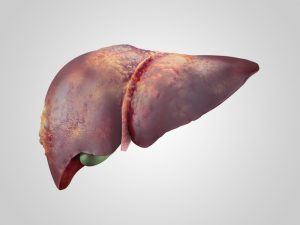 Non-alcoholic steatohepatitis (NASH) is linked to a leaky gut and may progress to liver fibrosis and cirrhosis. NASH is a more severe form of non-alcoholic fatty liver disease (NAFLD). As lead author Jay Luther explained, “Our study strengthens the clinical association between intestinal permeability and NASH, although we were unable to identify a mechanism.” Senior author Suraj J. Patel added, “We are hopeful that our findings add enthusiasm to the investigative efforts examining the liver-gut axis.”
Non-alcoholic steatohepatitis (NASH) is linked to a leaky gut and may progress to liver fibrosis and cirrhosis. NASH is a more severe form of non-alcoholic fatty liver disease (NAFLD). As lead author Jay Luther explained, “Our study strengthens the clinical association between intestinal permeability and NASH, although we were unable to identify a mechanism.” Senior author Suraj J. Patel added, “We are hopeful that our findings add enthusiasm to the investigative efforts examining the liver-gut axis.”
The researchers undertook a meta-analysis of literature looking at NASH patients. They aimed to test the hypothesis that NASH was associated with a leaky gut. Using an animal model, the researchers showed that NASH patients are more likely to develop an increased intestinal permeability, compared to healthy controls. The researchers found evidence that liver injury was preceded by the increase in intestinal permeability.
Advertisement
Rebecca G. Wells, associate editor of Cellular and Molecular Gastroenterology and Hepatology, added, “Hepatologists are currently ill-equipped at identifying the patients who are most likely to develop NASH. This is a pressing clinical challenge, as these patients are at greater risk for liver-related adverse events. This well-designed study enhances our understanding of the pathophysiology of NASH, which is critical to help identify high-risk NAFLD patients and therapeutic targets.”
Both being a growing problem in the U.S., NAFLD and NASH are highly associated with obesity and diabetes, other common conditions.
Treatment options for non-alcoholic steatohepatitis (NASH)
There are no specific therapies for non-alcoholic steatohepatitis, but patients are advised to reduce weight, eat a balanced and healthy diet, exercise regularly, avoid alcohol, and avoid unnecessary medications. These guidelines are also recommended to patients with cardiovascular disease, diabetes, cholesterol, and blood pressure issues as these are standard treatment approaches to aid in overall health.
Losing weight is heavily stressed in NASH treatment, as studies have shown weight loss can significantly improve disease outcome and, in some cases, reverse the existing damage. The research is underway to determine the percentage of weight loss required for the greatest improvement in liver health.
NASH patients generally have higher incidences of other medical conditions, such as diabetes, hypertension, or cholesterol. To improve the outcomes, it’s important that these other medical conditions are properly managed as well in order to reduce the risk of complications or worsening of liver health.
The ongoing experimental NASH treatments look at boosting antioxidants as a means of reducing oxidative stress. The effectiveness of these treatments is still unknown, so if you wish to try, speak to your doctor first.
